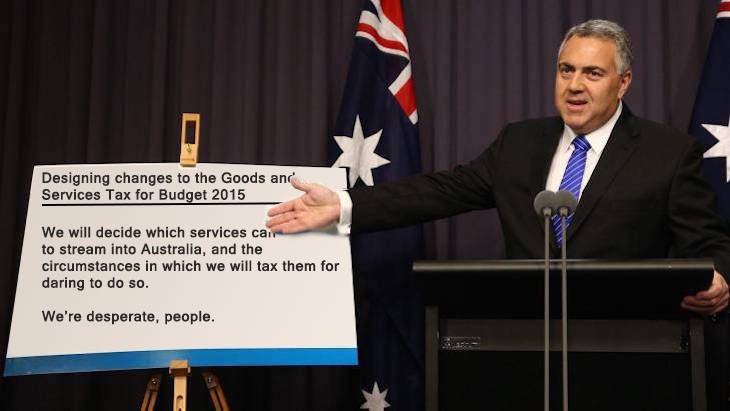
Australian Treasurer Joe Hockey has announced that GST-free imports of goods valued under $1000 will be coming to an end, following a decision of Australia’s Financial Relations Tax Reform Workshop, which counts amongst its members the federal and state treasurers.
According to the release from Treasurer Hockey, GST on import goods will be collected at the point of sale (much like domestic GST) by means of a ‘vendor registration model’. This involves companies such as Amazon and Netflix signing up to collect the 10% fee, and remitting it on a regular basis to the Australian Taxation Office. According to the Sydney Morning Herald, Hockey ‘expected most [vendors] to agree’ to collect the tax.
The decision to begin collection of 10% GST on digital purchases was made earlier this year, however this latest move will see tangible goods included as well. The government has plans to begin collecting GST on online purchases beginning from 22 July 2017, though there is a possibility of bringing this forward if the companies approached to collect the tax are amenable.
It is an interesting approach – theoretically, all retailers of physical goods into Australia will need to register for and collect 10% GST, and as we know from the Australian experience almost 15 years ago, this isn’t a trivial exercise. As any business operator collecting GST can attest, it creates work, and that comes at a cost. A micro-business can probably address its quarterly GST compliance requirements in an hour or two, and that time requirement only increases as the vagaries of GST come into play — input taxed items, GST free items and so on.
One could imagine that while the likes of Amazon and Netflix (to name but two) have systems in place to collect US Sales Tax, they would have to be willing to implement another such system, separately account for it, and set up a mechanism to report and remit to the ATO. One can’t imagine that they’re going to do that out of the kindness of their hearts, and equally, as companies operating outside Australia’s jurisdiction, one wonders exactly what incentive they’d have to actually comply — sign up, or we’ll be very angry at you?
The alternative, if major retailers thumb their collective nose at Australia’s request to collect tax for Australia, is to try and levy the tax on goods actually crossing the border, and that’s problematic for many reasons. Just as in Australia, goods that aren’t sold in the course of trade are generally not subject to GST. What if your family member in the US orders you a book from Amazon as a present? Should that be identified at the border as being from Amazon and GST levied? I’d argue no, but how would Customs know the difference?
It gets even more tricky if Australian consumers make a small effort to circumvent the measures; buy from Amazon, ship to a freight forwarder, who will re-package the parcel in such a way that it doesn’t look like a commercial parcel … how much GST will Australia collect then?
It gets very complicated around this point. If retailers don’t agree, and if customers are savvy, it will fall on Customs to identify parcels that should be subject to GST, levying it, and customers will have to pay those duties before their package is released to them. This might sound simple, but think about what that will actually entail; Customs check very little of what comes into Australia at the moment, because they really don’t have to. Adding this level of compliance will involve many more customs officers, who are not cheap to employ, and almost certainly new mechanisms to try and streamline the process for the end-users. Trying to identify parcels is not always easy, and almost certainly there’ll be GST levied on goods when it shouldn’t, and that looks very bad.
Basically, every way this works out is bad for the consumer, expensive for the retailer (and for the tax-payers), and of questionable value to Australia’s GST revenues in any event. We would suggest, humbly, that the reason people are buying overseas is not to avoid the 10% GST levied in Australia, but more to avoid the significant increase in cost (over and above that 10%) which seems to be pervasive in many product areas.
What do you think about this decision? Will it even pass the Parliament and become law? Will it be effective? Will retailers agree to collect the tax? There’s so many questions. Let us know your thoughts this weekend.





WEhen I was in Ozz a couple of weeks ago the states were asking the fed Gov to increase GST to 15% and remove a lot of existing exemtions so I suspect byt he time this kicks in GST will be 15% or higher..
Bwahaha another first rate idea from the first government in 80 years that has no science minister. Next they’ll be trying to round Pi to 3.
That could cause a few problems ?
My concern is that the scammers will have a field day with this. Then you have those nick nacks that you get out of China, they’ll add a GST charge wether or not they are required to and the Government GST will go down the drain or really into the hip pockets of these small dealers.
So Aussie businesses can’t compete and rather than asking the tough questions, the government is going to tax everything else? Newsflash: Aussie businesses weren’t competitive for a long time, even before ecommerce took off. Just look at how clothing retailers are doing now that H&M, Uniqlo and Topshop came here, or Myer/DJ’s vs Sephora (and those are the stores with physical storefronts), or even Foxtel vs Netflix. Even if you tax imports by 10%, more often than not, it’ll still be cheaper than buying in-store and retailers will complain about something else.
With things like cameras being 50% cheaper coming from overseas, adding 10% is meh, I’ll still get it from overseas. ie $400 local, $200 in HK, add 10% its only $220. Not going to change my mind at all!
Sad but true. The world has easy access to global online shopping now and the TPP or other trade agreements encourages globalised access so adding an import GST will only add to gov revenue.
Retailers here need to compete with an online presence, I guess.
Taxes on foreign products are usually frowned upon in free trade agreements are they not?
Yeah, true. From memory, I think their goal is to minimise tariffs but apply it to all trade partners (?)
It’ll never happen. Overseas companies have plenty of reasons not to comply – and they aren’t breaking any laws by not complying. If customs try to impose the GST on parcels as they enter the country then everything will grind to a halt as they simply can’t physically do it. The reason that the $1000 limit was put on in the first place is that it wasn’t feasible or economically viable to do so. The cost in collecting the GST far out weighed the income produced. It won’t become law in its current state. After lots of wrangling, they’ll probably… Read more »
if they try to charge it at customs, I’ll be buying all sub $1 shipped items I can find from china and ignoring them on arrival!!! Waste the gov money chasing up the collection!
What’s really bothersome is they put a 2017 date on this, by that time this government will be nothing more than a bad memory.
which means the new gov might be able to remove it, and this will all just be a bad memory.
So a great big new tax on everything.
what happens if i have a business that imports form over seas and then sells in Australia? Do i pay tax on the import and then my customers, pay tax again when i on sell to them?
If your overseas purchase is subject to GST, one would imagine you’re able to claim a GST credit on those purchases.
Yes, if you pay ‘GST’ to the overseas company and then claim that as a GST credit
Banks could collect the GST, NAB has no prob charging me a fee on all my irish google transactions, that are in AU$. I an happy to pay extra GST, as it means more money to the states and territories. Just wish the AU$ was > us$0.90.
Buy some Google play cards. Save bank fees and sometimes get discounts on the cards.
My guess is the way it will work is those companies that agree to collect tax they don’t have to collect, on behalf of the ATO, will be able to put a sticker on the parcel and sail through customs. Those that don’t will get held up for months and will incur a substantial fee in addition to the GST ‘for admin’. In other words Hockey will attempt to strongarm companies into it. Putting it at July 2017 tries to push the pain past the next election. However that date means it’s now an election issue, and possibly a TPP… Read more »
I find myself wondering whether it will actually become law .. just because the state/territory ministers agree to it, doesn’t mean the parliament will amend the GST law.
(though, sadly, it seems likely)
Definitely a TPP issue ?
“will incur a substantial fee in addition to the GST ‘for admin’.” The additional GST won’t change anyone’s purchasing habits, despite what a bunch of whining Australian retailers who are too unimaginative to compete in other ways might say. The likelihood of a not insignificant administrative fee from customs may be a different matter. Time will tell. It’s fair bet that most eBay-based overseas retailers wouldn’t be that interested in registering to collect and remit GST on purchases that may only be for a few $ each, so that might mean a large number of parcels having to be assessed… Read more »